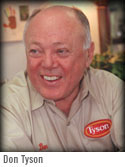
Tyson foods, provider of chicken and other meat products to all military commissaries since President Clinton was in office and still are too this day, and is based out of Springdale Arkansas, replaced hundreds of workers with transplanted Somalis and Pakistanis trying to escape unrest in Middle East and the horn of Africa. There are so many Muslims working at a Shelbyville Tennessee plant that they changed Labor Day celebrations to a Muslim holiday observance.
700 of the plant workers are Muslim, 250 of which are Somali. All are members of the union which has 1000 members. All of them are paying dues that goes directly into the coffers of the Democrats.
It's kind of strange that a plant that has 1200 workers yet over half of them come from outside of the United States.
Anybody who has been paying attention knows that the Clintons are good friends with the board of Tyson foods and has been using them as their main contractor to provide meat products to our military commissaries. When Bush was elected to office for a short period their contract was cancelled, but in less than a year Tyson products started showing up again in commissary food shelves.
Rumors abound of Tyson foods smuggling drugs inside of their chickens shipped out of Columbia. Tyson was indicted in 2001 for smuggling illegals into the US.
U.S. Indicts Tyson Foods for Alien Smuggling
northernlight ^ | December 19, | reuters
Posted on Wednesday, December 19, 2001 11:15:02 AM by classygreeneyedblonde
WASHINGTON (Reuters) - Tyson Foods Inc., the world's largest poultry processor, and six employees have been indicted for conspiracy to smuggle illegal immigrants into this country to work at its plants, the U.S. Justice Department said on Wednesday.
The 36-count indictment, unsealed in federal court in Tennessee, stemmed from a two-and-one half year undercover investigation by the Immigration and Naturalization Service (INS) into Tyson's business practices, the department said.
The Justice Department said 15 Tyson plants in nine states have been implicated in the conspiracy.
``The Department of Justice is committed to vigorously investigating and prosecuting companies or individuals who exploit immigrants and violate our nation's immigration laws. The bottom line on the corporate balance sheet is no excuse for criminal conduct,'' Assistant Attorney General Michael Chertoff said in a statement.
Tyson Foods: Locations
Links
U.S. Indicts Tyson Foods for Alien Smuggling
Tyson Foods: Our Story
Tyson Foods: Locations
Last edited:



 We know the unions will, down the road...
We know the unions will, down the road...